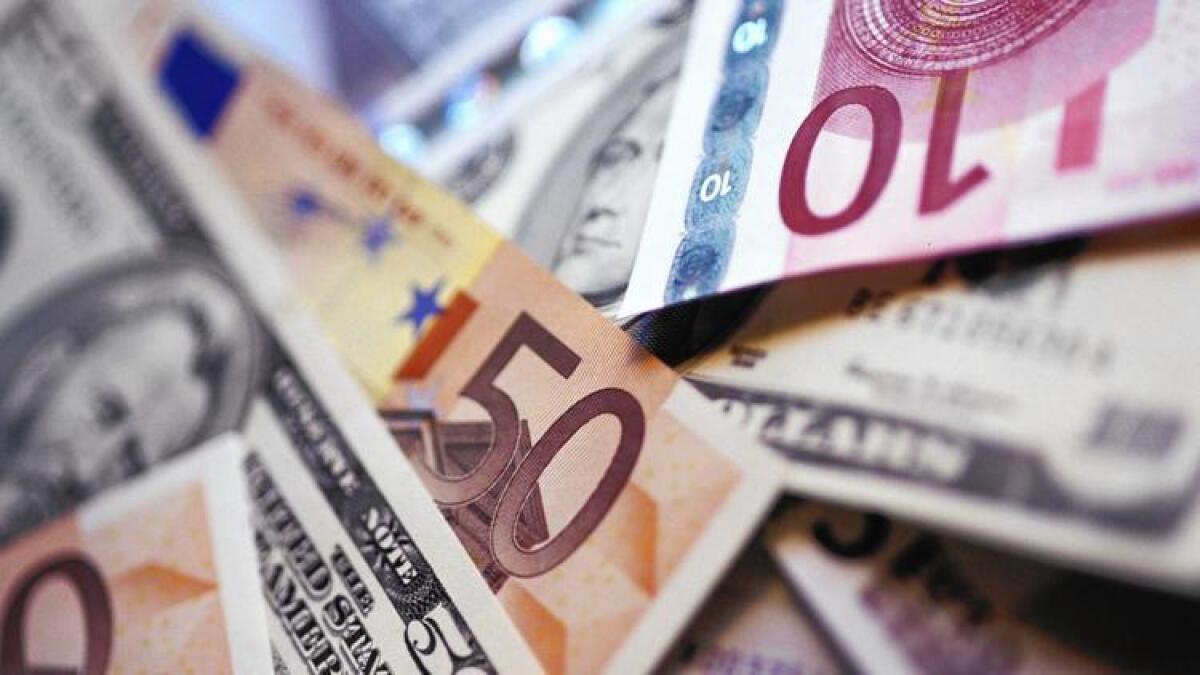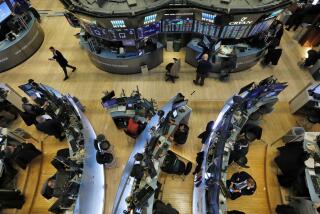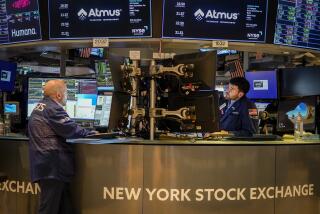‘Brexit’ raises fears of global currency wars

- Share via
Reporting from Washington — The quick rebound and relative calm in financial markets last week following Britain’s vote to leave the European Union were welcome relief to investors. Many surmised that markets were now looking past the so-called Brexit risks; some even declared victory.
Not so fast.
After initially recovering from the shocking June 23 referendum results, stocks in Europe and Asia extended losses Wednesday. While Wall Street ended up higher, U.S. and Japanese government bond yields touched record lows as anxious investors continued to run for safety.
The British pound fell to a fresh 31-year low — to less than $1.30 — in what some analysts see as a sign of prolonged volatility ahead for financial markets and increased contention among nations especially over currency values, which are critical in global trade and capital flows.
“It really looks like we’re on the cusp of FX [foreign exchange] wars,” said Christopher Vecchio, currency strategist at FXCM Inc., an online foreign exchange trading broker. “Competitive devaluations seem to be very much on the horizon.”
The U.S. dollar now looks to be strengthening anew, which would further strain American exports. A stronger dollar makes U.S. products more expensive in foreign markets, in turn pushing the Federal Reserve to stay on the sidelines of interest rate action. Minutes of the Fed’s last meeting in mid-June showed policymakers were reluctant to raise rates amid “considerable uncertainty” about the economic outlook, including risks abroad.
The Commerce Department reported Wednesday that total U.S. exports of goods and services slipped in May and were down 5% in the first five months of this year compared with a year earlier. Imports were up 2% through May, meaning an increase in the politically sensitive U.S. trade deficit.
The dollar had risen from late 2014, reflecting increasing oil prices, signs of forthcoming Fed rate hikes and the relative strength of the American economy that attracted inflows of capital. That rally peaked early this year and had been retreating, but the British referendum to quit the EU has brought a resurgence of demand for the dollar as investors seek the security of U.S. Treasury bonds.
See the most-read stories in Business this hour >>
Brexit has heightened investors’ fears about a recession in Britain, the EU’s second-largest economy, and a wider and protracted economic and political fallout to the region and potential spillovers to the world, including the U.S.
The British pound is down about 14% against the dollar since the referendum. Central banks in Europe are likely to hold down or lower rates in an effort to boost confidence and growth, which will add to the downward pressure on the pound as well as the euro.
Marc Chandler, a veteran currency trader and expert on dollar trends in New York, said he could see the pound dropping to $1.15 and the euro, now fetching about $1.10, falling to as low as the mid-80-cents level as it did in 2000 when there were uncertainties about its viability.
“I’m in the bullish-dollar camp,” Chandler said.
While that is good news for U.S. travelers to Europe, it is not welcomed by Americans on fixed incomes and other savers who have been waiting long for higher rates. And a stronger dollar will not only pinch exports but also U.S. companies’ bottom lines when they repatriate earnings back home.
“The U.S. is attractive because everybody else is getting unattractive,” said Robert Smith, president of Sage Advisory Services, an asset management firm that, since Brexit, pulled back on its exposure to international stocks and diverted that to the U.S.
Smith, too, sees the dollar strengthening, but only gradually as the Fed holds tight. Besides the threat of economies dueling over currencies, he is concerned there will be more turmoil in emerging economies as they grapple with rising dollar-denominated debt payments after years of gorging on cheap credit.
Brexit risks hang over Asia as well.
Like the dollar, the Japanese yen is a “safe-haven” currency, and it has jumped in recent days, much to the chagrin of Japanese officials who want to preserve their exports and the little economic growth that their nation has seen. Japan has signaled that it is prepared to intervene to stem the strength in the yen, which is down about 5% to 101 yen per dollar since the referendum.
China, meanwhile, has been carefully managing the yuan in the face of rising pressures. Beijing has said that its policymakers are calculating the value of the currency, also known as the renminbi, against a basket of many other currencies, not just the dollar. On Wednesday, officials set the yuan, which trades within a band of 2%, at 6.6857 to the dollar. That is the weakest since late 2010.
Analysts at UBS Securities in Hong Kong said that the yuan is likely to weaken further against the dollar, forecasting it to slide to 7 to 7.2 to the greenback at the end of 2017.
That could renew tensions with Washington lawmakers and other critics, who have long accused the Chinese of manipulating its currency to gain an edge in trade.
“Brexit was clearly a deflationary shock to China; the dollar appreciated and the yuan depreciated,” said David Loevinger, a former China specialist at the Treasury Department and now a top Asia strategist for the Los Angeles investment firm TCW.
Even so, Loevinger said that Beijing intervened to keep the yuan from weakening even more against the dollar, to avoid a rekindling of capital flight and panic among investors.
What’s more, he said, the fact that Beijing is being more transparent about how it is setting the yuan — and not relying overwhelmingly on the dollar to calculate its value as in the past — should help to head off any currency war.
Follow me at @dleelatimes
ALSO
Beverly Hills billionaire to take over the maker of Twinkies
Autopilot technology puts Tesla at risk for liability in crashes
UPDATES:
2:52 p.m.: This story was updated with additional background.
This story was originally published at 10:19 a.m.
More to Read
Inside the business of entertainment
The Wide Shot brings you news, analysis and insights on everything from streaming wars to production — and what it all means for the future.
You may occasionally receive promotional content from the Los Angeles Times.











